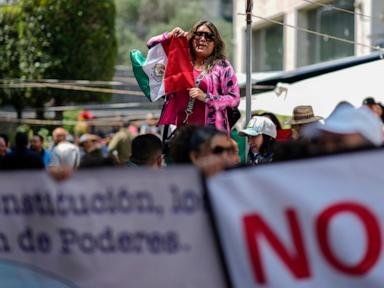MEXICO CITY — U.S. Ambassador Ken Salazar said Thursday a judicial overhaul proposed by Mexican President Andrés Manuel López Obrador poses a “risk” to Mexico’s democracy and “threatens the historic commercial relationship” between Mexico and the U.S.
The proposal, including a provision to require judges be elected, has spurred a fierce outcry from investors and financial institutions in recent days, with the Mexican peso steadily dropping in currency markets.
“Democracies can’t function without a strong, independent and non-corrupt judicial branch,” Salazar told reporters. “Any judicial reform needs to have safeguards that the judicial branch is strengthened, and not the subject to political conditions.”
He said the proposed overhaul would “help cartels and other bad actors take advantage of inexperienced judges with political motivations,” and “create turbulence” both economically and politically for years to come.
The measures would allow virtually anyone with a law degree with a few years experience as a lawyer to become a judge through popular vote.
Given major electoral wins by López Obrador’s Morena party in June, academics, financial institutions and court employees say the changes would pave the way to stack courts with politically biased judges. That could hand the governing party control all three branches of government and dealing a blow to checks and balances, they warn.
The proposal must be approved by Mexico’s newly elected congress, which will take office Sept. 1 with Morena and its allies holding a majority. The president’s six-year term runs to Sept. 30, and President-elect Claudia Sheinbaum has also defended the proposal.
Salazar dodged multiple questions by reporters asking if adoption of the overhaul would result in any sanctions or actions by U.S. authorities against Mexico.
López Obrador, a populist averse to independent regulatory agencies, has long been at odds with the judicial branch.
He contends judges are part of a “mafia” that opposes him, and says the proposal is meant to clean up corruption. He has gone on winding rants against the judicial system, ignored court orders and publicly sparred with judges whose rulings he has disagreed with.
While Salazar said rooting out corruption in Mexico’s judiciary is not a bad idea, he expressed deep concern over the prospect of having judges elected.
“The direct election of judges represents a risk for the functioning of Mexico’s democracy, and the integration of the American, Mexican and Canadian economies,” Salazar said.
Criticism of the proposed changes has mounted as thousands of judges and court employees started striking this week, bringing most federal courts to a standstill.
Their concerns were shared by major financial institutions in both the U.S. and Mexico.
On Tuesday, Morgan Stanley downgraded its recommendation for investing in Mexico, saying the overhaul would “increase risk.” Others, like Citibanamex, warned that passage of the proposal could end in the “cancellation of liberal democracy.” The Mexican peso has fallen since court workers started their strikes Monday.
López Obrador has brushed off the concerns, arguing Wednesday that the peso’s dip has been due to larger global market changes. He said the idea that his judicial overhaul has caused the peso’s problem is a “complete lie.”
